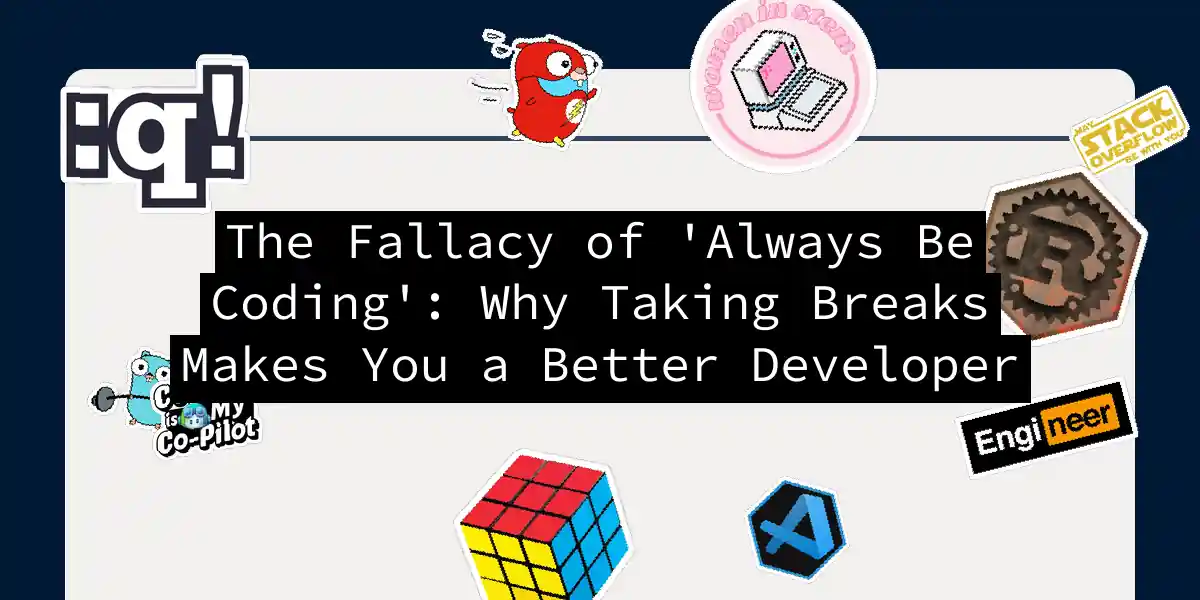The Myth of Perpetual Programming
We’ve all heard the tech-bro mantras: “Code or die,” “Sleep is for the weak,” and the classic “Real programmers ship on caffeine and hubris.” But what if this toxic treadmill of non-stop coding is actually making us worse developers? The “Always Be Coding” (ABC) mentality is a logical fallacy – specifically a blend of No True Scotsman (“Real developers code 14 hours daily”) and Wishful Thinking (“If I code constantly, I’ll outperform everyone”). I learned this the hard way during my “Dark Summer of Stack Overflow.” I’d pull 16-hour coding binges, convinced I’d outwork my peers. Instead, I introduced a bug that silently corrupted user data for three weeks before detection. The fix? 5 lines of code. The lesson? My exhausted brain missed what fresh eyes would’ve caught instantly.
Why Your Brain Needs Breaks (Neurochemical Proof)
Coding isn’t just typing – it’s complex cognitive labor requiring executive function, memory synthesis, and creative pattern-matching. Continuous focus depletes glucose and neurotransmitters like dopamine. Breaks replenish these resources. Consider:
Studies show developers solve problems 23% faster after stepping away. My “Aha!” moments consistently arrive during walks or shower breaks, not when glued to VSCode.
Step-by-Step: Building a Sustainable Coding Rhythm
1. The Pomodoro 2.0 Technique (with Technical Enforcement)
# Install break reminder (Mac/Linux)
brew install terminal-notifier # macOS
sudo apt install libnotify-bin # Linux
# Create break scheduler script (save as pomodoro.sh)
while true; do
echo "Coding session started at $(date)"
sleep 1500 # 25 minutes
terminal-notifier -message "TAKE A BREAK! Walk away for 5 minutes" -title "Pomodoro Alert"
sleep 300 # 5 minute break
terminal-notifier -message "RESUME CODING" -title "Break Over"
done
Why this works: Forces disengagement every 25 minutes – crucial for resetting attention circuits.
2. The Rubber Duck Debugging Walk
When stuck on a bug:
- Explain the problem aloud to your rubber duck
- Immediately go for a 10-minute walk
- Return and re-approach the code Works 80% of time: Physical movement boosts divergent thinking by 50%.
3. Scheduled “Creative Waste” Blocks
Calendar-block 90 minutes weekly for:
- Doodling architecture diagrams
- Reading non-tech books
- Playing with unrelated APIs My personal win: A random physics article inspired our queue optimization algorithm.
Debugging Your Work Culture
Many teams enable ABC fallacy through:
- False urgency (“This could’ve shipped yesterday!”)
- Visibility theater (Slack green dots as productivity proxies)
- Feature factory mentality (Quantity over quality) Counter-tactics:
- Push back with: “Rushing causes tech debt. Estimate includes testing/refactoring.”
- Advocate for “Focus Thursdays” (no meetings)
- Track outcomes (bugs prevented, performance gains) not just activity
The Art of Strategic Loafing
Here’s my controversial take: The best code is often written away from the keyboard. Last quarter, I:
- Solved a persistent race condition while gardening
- Designed our cache invalidation strategy during a museum visit
- Named three critical variables while baking sourdough This isn’t laziness – it’s cognitive offloading. Your subconscious keeps processing problems while conscious mind rests. Like background Garbage Collection for your brain!
Reclaim Your Right to Recharge
The next time someone implies you’re “not dedicated” for leaving at 6 PM, remember: Sustainable coding beats heroic sprints. We don’t praise surgeons for operating 48 hours straight – why glorify coding marathons? Your challenge this week: Schedule 3 deliberate breaks daily. Observe how your code quality and problem-solving velocity change. Then tell me – does constant coding really make you better? Or just more exhausted? Now if you’ll excuse me, my rubber duck and I have a date with the coffee machine. ☕️🦆
